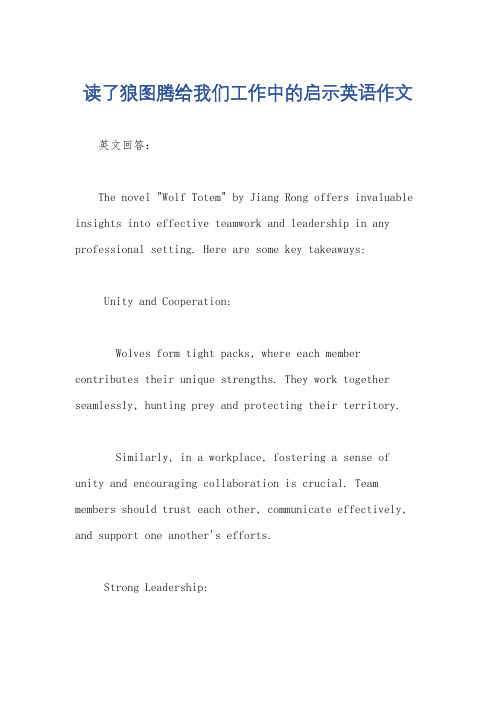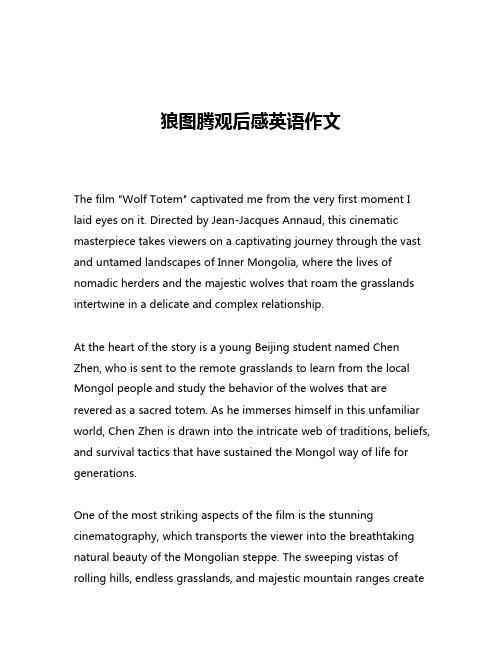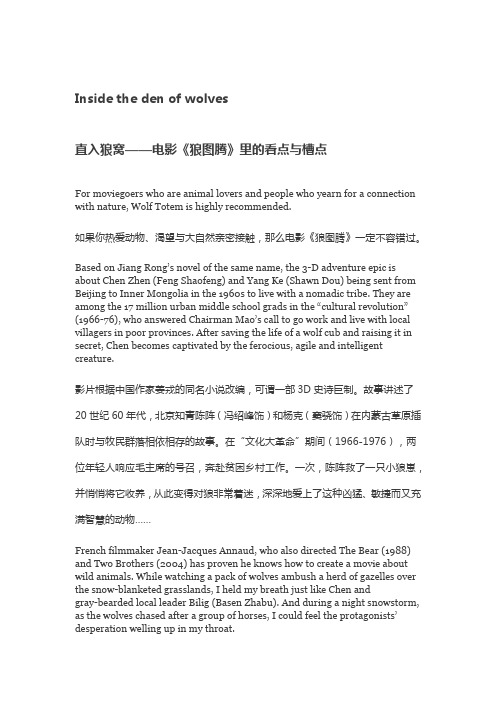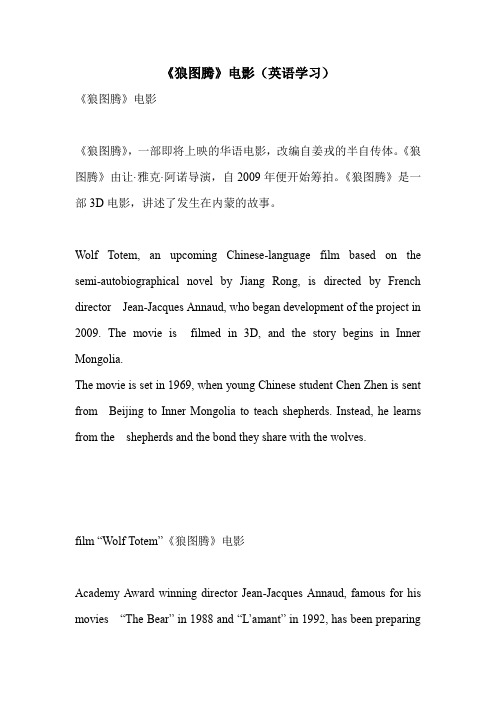狼图腾电影英文介绍
读了狼图腾给我们工作中的启示英语作文

读了狼图腾给我们工作中的启示英语作文英文回答:The novel "Wolf Totem" by Jiang Rong offers invaluable insights into effective teamwork and leadership in any professional setting. Here are some key takeaways:Unity and Cooperation:Wolves form tight packs, where each member contributes their unique strengths. They work together seamlessly, hunting prey and protecting their territory.Similarly, in a workplace, fostering a sense of unity and encouraging collaboration is crucial. Team members should trust each other, communicate effectively, and support one another's efforts.Strong Leadership:Wolf packs have a clear hierarchy with an alpha male leading the charge. The alpha provides guidance, makes decisions, and sets the tone for the pack.In the workplace, effective leaders inspire and motivate their teams. They provide clear direction, set expectations, and create an environment where employeesfeel valued and empowered.Adaptability and Resilience:Wolves are highly adaptable animals that can survive in harsh and changing environments. They possess a strong survival instinct and are quick to respond to challenges.In the ever-evolving business landscape, teams need to be able to adjust to changing demands and market conditions. Embracing adaptability, problem-solving skills, and resilience is essential for success.Communication and Coordination:Wolves communicate effectively through a variety of vocalizations and body language. This allows them to coordinate their actions, hunt prey, and avoid danger.In work teams, open communication, active listening, and effective information sharing are vital. Clear communication channels facilitate seamless collaboration and efficient project execution.Respect for Hierarchy:Wolf packs adhere to a strict hierarchy, with younger wolves deferring to their elders. This ensures order and prevents conflict within the pack.In the workplace, respecting the chain of command and acknowledging the experience and authority of senior colleagues foster a harmonious and productive work environment.Shared Values and Purpose:Wolves share a common goal: survival. This shared purpose drives their actions and unites the pack.In the workplace, establishing a clear mission, vision, and set of shared values creates a sense of purpose and aligns team members towards a common goal.Continuous Learning and Growth:Wolves are constantly observing and learning from their surroundings. They adapt their hunting strategies and behavior based on new experiences.In the workplace, teams should encourage continuous learning, skill development, and knowledge sharing to stay abreast of evolving industry trends and best practices.中文回答:《狼图腾》这本书为我们在工作中的团队合作和领导力提供了宝贵的启示。
狼图腾观后感英语作文

狼图腾观后感英语作文The film "Wolf Totem" captivated me from the very first moment I laid eyes on it. Directed by Jean-Jacques Annaud, this cinematic masterpiece takes viewers on a captivating journey through the vast and untamed landscapes of Inner Mongolia, where the lives of nomadic herders and the majestic wolves that roam the grasslands intertwine in a delicate and complex relationship.At the heart of the story is a young Beijing student named Chen Zhen, who is sent to the remote grasslands to learn from the local Mongol people and study the behavior of the wolves that are revered as a sacred totem. As he immerses himself in this unfamiliar world, Chen Zhen is drawn into the intricate web of traditions, beliefs, and survival tactics that have sustained the Mongol way of life for generations.One of the most striking aspects of the film is the stunning cinematography, which transports the viewer into the breathtaking natural beauty of the Mongolian steppe. The sweeping vistas of rolling hills, endless grasslands, and majestic mountain ranges createa sense of vastness and isolation that perfectly complements the themes of the story. The camera work is particularly impressive during the wolf hunting sequences, where the viewer is plunged into the heart of the action, feeling the thrill and the danger of the pursuit.But "Wolf Totem" is more than just a visual feast; it is a thought-provoking exploration of the delicate balance between man and nature, and the consequences of disrupting that balance. The film presents a nuanced portrayal of the relationship between the Mongol herders and the wolves, highlighting the mutual respect and understanding that has developed over centuries of coexistence. The wolves are not mere beasts to be feared and conquered, but rather revered as spiritual guides and symbols of strength, resilience, and freedom.Through the character of Chen Zhen, the film examines the clash between the traditional Mongol way of life and the encroaching forces of modernization and industrialization. As the young student witnesses the impact of human intervention on the fragile ecosystem of the grasslands, he is forced to confront his own preconceptions and grapple with the ethical implications of his actions.One of the most powerful scenes in the film is the depiction of the wolf hunt, where the Mongol herders use a complex and highlyritualized approach to tracking and capturing the wolves. The scene is both thrilling and heart-wrenching, as the viewer is torn between the awe-inspiring display of the hunters' skill and the realization that their actions are ultimately driven by a need to protect their way of life from the perceived threat of the wolves.The film's exploration of the themes of tradition, modernity, and the delicate balance of nature is further enhanced by the strong performances of the cast. The lead actor, Feng Shaofeng, delivers a nuanced and compelling portrayal of Chen Zhen, capturing the character's transformation from a naive outsider to a deeply conflicted individual who must reconcile his own values with the harsh realities of the grasslands.The supporting cast, too, is equally impressive, with the Mongol actors delivering performances that are both authentic and emotionally resonant. The film's attention to detail in its portrayal of Mongol culture and customs is particularly noteworthy, adding depth and authenticity to the storytelling.One of the most powerful aspects of "Wolf Totem" is its ability to transcend the boundaries of traditional narrative cinema and engage the viewer on a deeper, more visceral level. The film's use of symbolism and metaphor, particularly in its depiction of the wolves and their role within the Mongol belief system, is both thought-provoking and emotionally impactful.The wolves, for instance, are not simply animals to be hunted and conquered, but rather embodiments of the Mongol people's own spirit and resilience. Their fierce independence, their unwavering loyalty to their pack, and their ability to adapt to the harsh realities of their environment all serve as powerful metaphors for the Mongol way of life.Similarly, the film's exploration of the delicate balance between man and nature is a universal theme that resonates with audiences across cultures and backgrounds. The destruction of the grasslands, the depletion of natural resources, and the erosion of traditional ways of life are all issues that are relevant to communities around the world, and "Wolf Totem" offers a poignant and thought-provoking perspective on these critical concerns.Ultimately, "Wolf Totem" is a cinematic masterpiece that transcends the boundaries of genre and leaves a lasting impression on the viewer. Through its stunning visuals, its nuanced performances, and its thought-provoking exploration of the human condition, the film invites us to reflect on our own relationship with the natural world and the consequences of our actions.Whether you are a fan of epic storytelling, a lover of naturedocumentaries, or simply someone who appreciates the power of cinema to transport and transform, "Wolf Totem" is a must-see film that will linger in your mind long after the credits have rolled.。
wolf totem狼图腾英语简介及评论

Have you ever read the novel --“Wolf totem[ˈtəʊtəm]”(狼图腾) ?I guess most of you have seen this movie. The movie “Wolf totem” is adapted from the novel whose author is Jiang rong(姜戎)。
I have read this book, it’s great.Actually, it has taken 30 years of Jiang Rong's life to complete the novel "Wolf Totem." In fact a work of this depth can hardly be called a novel, but rather a piece of research, with folk tradition(民间传统), history and philosophy(哲学)。
After all, it tells the inhabitants’life in (inner Mongolia 内蒙古) and their complicated feelings towards the wolf. They hate wolf, because wolf invaded their home. But they also need wolf to help them to keep the ecological balance. Grassland wolf is the Mongolia’s national primitive totem(蒙古民族的原始图腾).According to the hero “Chen zhen” who is the educated youth(知青) and went to inner Mongolia. At first, he was afraid of wolf, but finally,he was addicted with wolves’ spirit. Now there are many disagreement about wolf totem and dragon totem on the Internet. What’s more, many people think the author’s philosophical ideas has problem. I don’t think these are the essence of this novel. In my opinion,“f reedom, independent, brave spirit, never surrender character ”are the "Wolf Totem" themes and writers real expectation.。
《狼图腾》(英文)

74zoetroPedirector: Jean-Jacques Annaud writers: Jean-Jacques Annaud,John Collee, Lu Wei, Alain godardWhen Jiang Rong’s (姜戎)novel Wolf Totem was published in 2004, it saw huge sales, won critical acclaim (the inaugural Man Asia Literary Prize), achieved resonance with the public, and was generally seen as a tour deforce. Sadly, the 2015 film adaptation is unlikely to do the same, the movie often feeling as bereft and empty as the Inner Mongolian grasslands on which it was shot; the film is a sheep in wolf’s clothing, if you will forgive strained lupine metaphors. The film follows the journey of Chen Zhen (Feng Shaofeng) and his friend Yang Ke (Shawn Dou) at the start of the Cultural Revolution when they are posted from Beijing to Inner Mongolia to help teach Mandarin to nomadic herdsmen. Along the way our young protagonists learn many things, among them: city boys will never truly understand rural life (and might be better off in Beijing); political apparatchiks are largely bothersome and don’t know what they are doing (especially when it comes to dealing with shepherds); and, most importantly, don’t mess with the wolves, for they are spiritual animals.Fundamentally, the film aims at penetrating two overlapping themes: firstly, that city types, and by the extension the government, should be wary of imposing their will upon the fountain of knowledge that are indigenous ethnic populations, in this case wise and noble herdsmen who have existed for centuries without interference from outsiders. Secondly, do not toy with the delicate balance of nature, specifically that between grass, gazelle, sheep, man, and wolf, as this will inevitably cause intense ecological disaster. Of course both of these themes are immensely laudable, but when such ideas are delivered without conviction, meaning, or the pre-requisite skill, instead seemingly just for the sake of it, well, nobody listens and it all ends badly—this is largely the case with Wolf Totem.Chen Zhen: Did the awe that the Mongolian wolf inspiredcome from a cult deeply entrenched in man’s brain since time immemorial? My heart filled with gratitude for the secret forces that came to my rescue. I had the feeling that I’d started to open the door on the spiritual world of the grassland people.Y~n c2oyu1nl1ng su6 ch2nsh8ng de k6ngj& y^ j#ngw-i, sh#bushi c5ng yu1nsh@《狼图腾》L1ng T%t9ngW olf totem5Annaud is a French director best known for The Name of the Rose,The Lover, and Seven Years in Tibet. He has won four Cesar awards and is believed to have been picked for Wolf Totem due to having successfully directed animals in several films. The wolves used in the film were not CgI, but wolf cubs picked from Chinese zoos and trained over several years.jean-jacqueS annaudsh!q~ q@, ji&sh# r9nmen x~nl!ng zh4ng su6 ch5ngb3i de t%t9ng. W6 du# zh- zh6ng sh9nm# de l#li3ng j@ y^ w6 de b`ngzh& m2nhu1i g2nj~. W6 y6u zh6ng g2nju9, w6 y@j~ng tu~k`i le t4ngw2ng c2oyu1nr9nm!n j~ngsh9n sh#ji- de n3 sh3n m9n.因草原狼所产生的恐惧与敬畏,是不是从原始时期起,就是人们心灵中所崇拜的图腾。
狼图腾电影英文介绍

《狼图腾》电影英文介绍狼图腾(冯绍峰、窦骁等主演的电影《狼图腾》)Wolf Totem (William Feng, Dou Xiao starred in the movie "Wolf Totem")根据姜戎的畅销小说《狼图腾》改编的同名电影历时7年的艰辛准备,由法国著名电影导演让·雅克·阿诺导演,冯绍峰、窦骁主演。
电影主要讲述了“一个人的改变与成长”。
According to Jiang Rong's best-selling novel "Wolf Totem" f ilm of the same name lasted 7 years of painstaking preparation, by the famous French film director Jean Jacques Arno, starring Dou Xiao, William Feng. The film focuses on the "change and g rowth of a person".蒙古族以苍狼白鹿为图腾成吉思汗为什么能够远征到欧洲进行大屠杀?中国人性格里究竟狼的成分有多少?有狼的风景会带给你怎样的震撼与冲击?那些蒙古草原狼随时从书中呼啸而出:狼的每一次侦察、布阵、伏击、奇袭的战术;狼对气象、地形的利用;狼族中的友爱亲情;狼与草原万物的关系;小狼艰难成长过程――无不使我们联到人类,进而思考一个个疑问:当年十几万蒙古骑兵为什么能够远征到欧洲进行大屠杀?中华民族今日辽阔疆土由来的原因?历史上究竟是华夏文明征服了游牧民族,还是游牧民族一次又一次地为汉民族输血才使中华文明得以延续?为什么中国马背上的民族,不崇拜马图腾而信奉狼图腾?Mongolia nationality to wolf deer totem why could Gen Gi Khan expedition massacre to Europe? How much is the wolf co mponents Chinese character? Shock and impact the wolf scenery will give you what kind of? The Mongolia grassland wolf at any time from the book roared out: Wolf every time reconnaissance, array, ambush, surprise tactics; the wolf on the weather, terrain; friendly affection in the relationship between the wolf and the wolf; grassland all things; he difficult growing process -- all with out exception makes us to human, and then think about a questi on: why can the hundreds of thousands of Mongolia cavalry exp edition massacre to Europe? The reason that the Chinese nation t oday the vast expanse of origin? The history of Chinese civilizati on is really conquered the nomads, or nomadic again and again as the Han nationality of blood transfusion to the continuity of t he Chinese civilization? Why don't the Chinese nation on horseba ck, and embrace the Wolf totem worship a horse?。
wolf totem狼图腾英文

Wolf
Sheep
• • • • •
bold and poweerful ferocious meat-eating wild nature earn his own living
• • • • •
timid and overcautious docile grazing inertia being in captivity
Characters
Chen Zhen:a Beijing intelligent youth , love wolf Yang ke : Chen Zhen’s best friend , love wolf
Bi Lige : recognize the wolves as teachers
Bao Shungui : the attitude to wolves different from Chen Zhen
05
Apocal ypse
01 Author
02
Backgro und
04 Brief
introducti on
Characte rs
03
About The Author
• Jiang Rong was born in Jiangsu in 1946. He graduated from the middle school attached to the China Central Academy of Fine Arts in 1966 • His education cut short by events in China, the twenty-one-year-old Jiang volunteered to work in Inner Mongolia's East Ujimchin Banner in 1967, where he lived and labored with the native nomads until the age of thirty-three. He took with him two cases filled with Chinese translations of Western literary.
直入狼窝——电影《狼图腾》里的看点与槽点 Inside the den of wolves

Inside the den of wolves直入狼窝——电影《狼图腾》里的看点与槽点For moviegoers who are animal lovers and people who yearn for a connection with nature, Wolf Totem is highly recommended.如果你热爱动物、渴望与大自然亲密接触,那么电影《狼图腾》一定不容错过。
Based on Jiang Rong’s novel of the same name, the 3-D adventure epic is about Chen Zhen (Feng Shaofeng) and Yang Ke (Shawn Dou) being sent from Beijing to Inner Mongolia in the 1960s to live with a nomadic tribe. They are among the 17 million urban middle school grads in the “cultural revolution” (1966-76), who answered Chairman Mao’s call to go work and live with local villagers in poor provinces. After saving the life of a wolf cub and raising it in secret, Chen becomes captivated by the ferocious, agile and intelligent creature.影片根据中国作家姜戎的同名小说改编,可谓一部3D史诗巨制。
故事讲述了20世纪60年代,北京知青陈阵(冯绍峰饰)和杨克(窦骁饰)在内蒙古草原插队时与牧民群落相依相存的故事。
《狼图腾》电影(英语学习)

《狼图腾》电影(英语学习)《狼图腾》电影《狼图腾》,一部即将上映的华语电影,改编自姜戎的半自传体。
《狼图腾》由让·雅克·阿诺导演,自2009年便开始筹拍。
《狼图腾》是一部3D电影,讲述了发生在内蒙的故事。
Wolf Totem, an upcoming Chinese-language film based on the semi-autobiographical novel by Jiang Rong, is directed by French director Jean-Jacques Annaud, who began development of the project in 2009. The movie is filmed in 3D, and the story begins in Inner Mongolia.The movie is set in 1969, when young Chinese student Chen Zhen is sent from Beijing to Inner Mongolia to teach shepherds. Instead, he learns from the shepherds and the bond they share with the wolves.film “Wolf Totem”《狼图腾》电影Academy Award winning director Jean-Jacques Annaud, famous for his movies “The Bear” in 1988 and “L’amant” in 1992, has been preparingto bring the story to the big screen for seven years, and started filming in July 2012.The director and his team had to overcome harsh difficulties in the wild, such as low temperatures, bad weather, mosquito swarms and safety issues when dealing with wolves. Long, double fences kept 35 wild animals under control while they were being trained. The crew even raised young wolves in order to build an emotional connection with them.Chinese actors Feng Shaofeng and Dou Xiao play the leading roles in the movie, and had to learn how get along with the wolves.“The wolf trainer says don’t let the Wolf get too excited to see you; If they don’t like you at the first sight, then they won’t like u for the rest of their life.” said Feng.And as people who read the novel will know, the story takes you to the heart of the grassland, and also teaches you things you never knew about wolves.。
- 1、下载文档前请自行甄别文档内容的完整性,平台不提供额外的编辑、内容补充、找答案等附加服务。
- 2、"仅部分预览"的文档,不可在线预览部分如存在完整性等问题,可反馈申请退款(可完整预览的文档不适用该条件!)。
- 3、如文档侵犯您的权益,请联系客服反馈,我们会尽快为您处理(人工客服工作时间:9:00-18:30)。
《狼图腾》电影英文介绍
狼图腾(冯绍峰、窦骁等主演的电影《狼图腾》)
Wolf Totem (William Feng, Dou Xiao starred in the movie "Wolf Totem")
根据姜戎的畅销小说《狼图腾》改编的同名电影历时7年的艰辛准备,由法国著名电影导演让·雅克·阿诺导演,冯绍峰、窦骁主演。
电影主要讲述了“一个人的改变与成长”。
According to Jiang Rong's best-selling novel "Wolf Totem" f ilm of the same name lasted 7 years of painstaking preparation, by the famous French film director Jean Jacques Arno, starring Dou Xiao, William Feng. The film focuses on the "change and g rowth of a person".
蒙古族以苍狼白鹿为图腾成吉思汗为什么能够远征到欧洲进行大屠杀?中国人性格里究竟狼的成分有多少?有狼的风景会带给你怎样的震撼与冲击?那些蒙古草原狼随时从书中呼啸而出:狼的每一次侦察、布阵、伏击、奇袭的战术;狼对气象、地形的利用;狼族中的友爱亲情;狼与草原万物的关系;小狼艰难成长过程――无不使我们联到人类,进而思考一个个疑问:当年十几万蒙古骑兵为什么能够远征到欧洲进行大屠杀?中华民族今日辽阔疆土由来的原因?历史上究竟是华夏文明征服了游牧民族,还是游牧民族一次又一次地为汉民族输血才使中华文明得以延续?为什么中国马
背上的民族,不崇拜马图腾而信奉狼图腾?
Mongolia nationality to wolf deer totem why could Gen Gi Khan expedition massacre to Europe? How much is the wolf co mponents Chinese character? Shock and impact the wolf scenery will give you what kind of? The Mongolia grassland wolf at any time from the book roared out: Wolf every time reconnaissance, array, ambush, surprise tactics; the wolf on the weather, terrain; friendly affection in the relationship between the wolf and the wolf; grassland all things; he difficult growing process -- all with out exception makes us to human, and then think about a questi on: why can the hundreds of thousands of Mongolia cavalry exp edition massacre to Europe? The reason that the Chinese nation t oday the vast expanse of origin? The history of Chinese civilizati on is really conquered the nomads, or nomadic again and again as the Han nationality of blood transfusion to the continuity of t he Chinese civilization? Why don't the Chinese nation on horseba ck, and embrace the Wolf totem worship a horse?。
